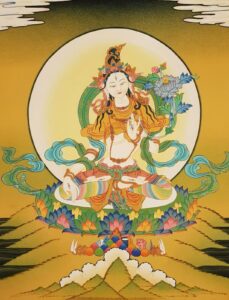 These days, uncertainty and suffering seems to pervade our experience – whether it be connected to environmental change, political posturing, or social unrest. Buddhist contemplative practices encourage the practitioner to connect to Tara through images and supplications for her for health, longevity, and protection from obstacles. Tara is often invoked as an energetic quality – a diety who embodies compassion and wisdom. We are encouraged to *become* Tara – through the confidence that our mind is inseparable from the enlightened brilliance and peacefulness that Tara represents.
These days, uncertainty and suffering seems to pervade our experience – whether it be connected to environmental change, political posturing, or social unrest. Buddhist contemplative practices encourage the practitioner to connect to Tara through images and supplications for her for health, longevity, and protection from obstacles. Tara is often invoked as an energetic quality – a diety who embodies compassion and wisdom. We are encouraged to *become* Tara – through the confidence that our mind is inseparable from the enlightened brilliance and peacefulness that Tara represents.
How to take this leap into unconditioned brilliance? Perhaps the practice of meditation, which calms the yearnings and discursiveness of our ego, is momentarily put on hold, set aside, so that this intrinsic brilliance can manifest.
Tara is represented in many thangkas (Tibetan Buddhist painted representations) as a support for how we might “become Tara.” Let’s take a closer consideration of how these images point to a living and breathing experience.
A felt experience of space – Tara’s “field of merit” allows her to become more than a two-dimensional image. Perhaps imagining her walking into your house and being seated in a nearby cushion, holding a flower in her left hand, her right hand in offering. A gentle breeze is blowing the scarf adorning her shoulders, and the scent of lotuses is apparent. Her seven eyes adorn not just her face but also the palms of her hands and feet, indicating the knowing wisdom that emanates for activity as well as seeing. The clarity of her suddenly arriving in your practice space is supported by descriptions in the sadhana practice.
Another aspect is her purity – the unconditional quality of her existence. She represents a purity that is beyond a conventional experience – the flowers, her expression and posture of offering – is an unfettered expression of brilliance and radiance. And yet this brilliance is not afraid to directly interface with our difficulties – the relative kitchen sink experiences of our experience – not shying away but instead reaching out with her hand into our worldly experience. She is peaceful and grounded, but also interactive and in communication with this relative world in need of compassion and healing.
These aspects of visualization are sometimes called “creation stage” or “uttpattikrama” – of using our mind and senses to envision an energetic field of activity based on Buddhist principles. By honing our awareness to imagine Tara’s clarity, purity, and intrinsic energy – an opening occurs that is beyond personal experience, allowing blessings of Tara rain down upon us.